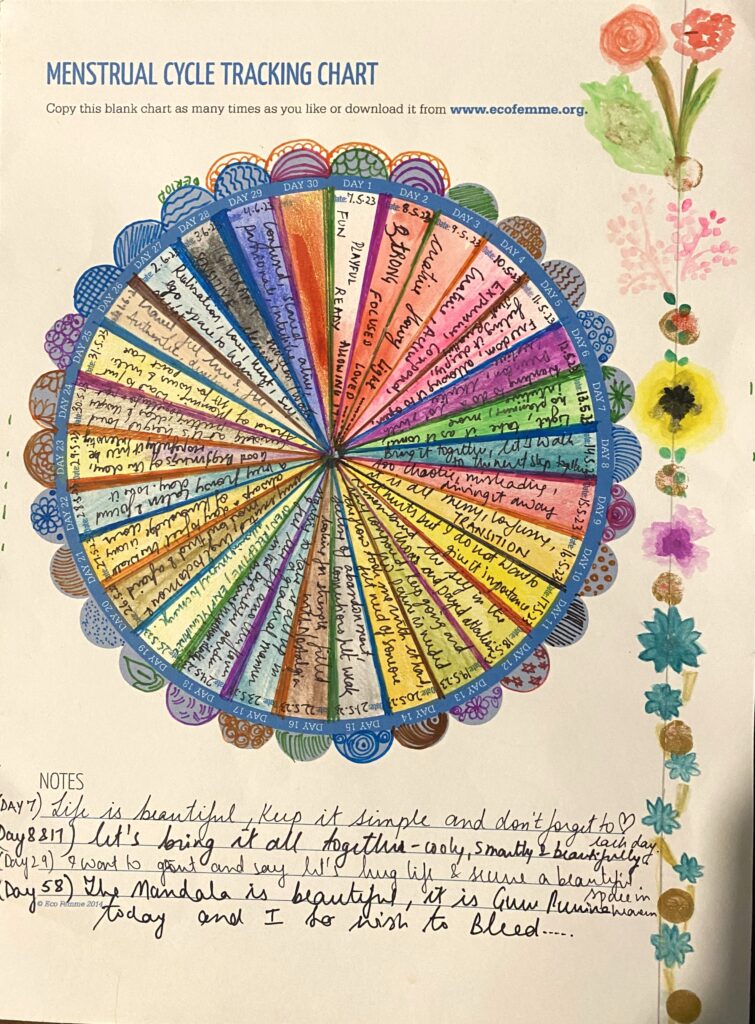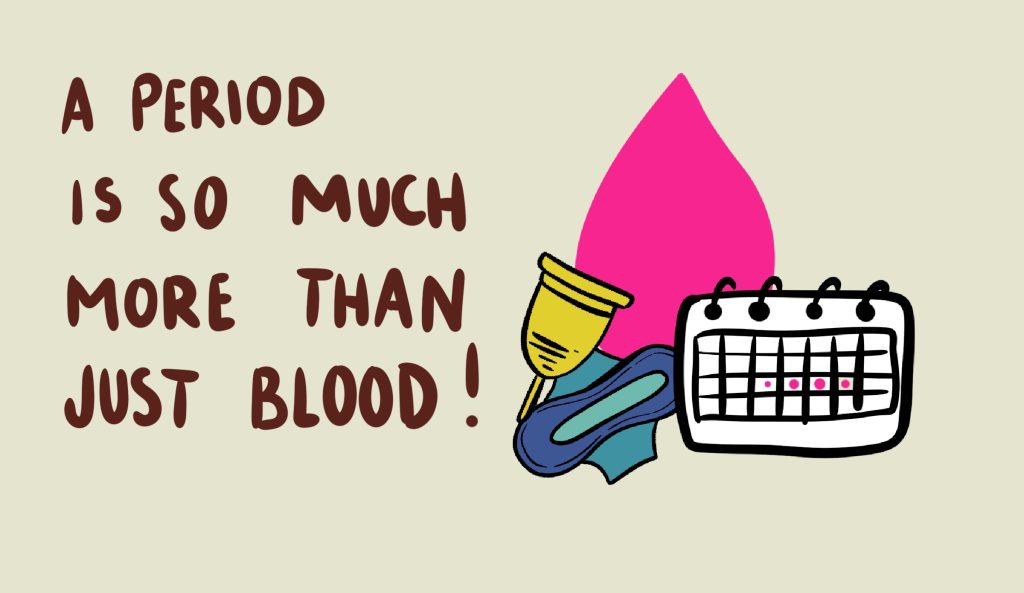Despite Polycystic Ovarian Syndrome remaining the most common ovulatory disorder of the female reproductive system affecting a really high 4-12% of women, it’s still very difficult to diagnose. An estimated 50% of women who have the condition don’t know what ‘label’ to give it. I can imagine that finally understanding what is happening in the bodies of those diagnosed is a relief.
With a seemingly disparate combination of menstrual/mind/metabolic things like appetite changes, emotional complaints, physical pain and discomfort with hugely irregular cycles and long periods of bleeding, it’s no wonder that so often this results in a lot of to-ing and fro-ing from the doctor’s for blood tests, pelvic exams, and x-rays.

In many cases the syndrome raises it’s head at puberty, when ovulation first happens. For a young girl who doesn’t know what her flow, the body sensations of having a period, and her cycle length is supposed to be like, this must be a confusing introduction to menstruation. In a friend’s case her doctor told her that her cycle could take a couple of years to settle down, so as a young girl unversed in the embodied knowledge of menstruating, she accepted this and suffered for a too-long time. These kinds of stories are all too common because there are, as we will see, many facets to the Polycystic Ovarian Syndrome puzzle.
So what are the symptoms of Polycystic ovaries?
Women affected may suffer sudden weight gain, facial hair, irregular menses, enlarged ovaries, ovarian cysts, acne, growth of body hair, high blood pressure, dandruff, baldness, high insulin levels, obesity, high cholesterol, type II diabetes, depression anxiety bipolar and binge-eating, and 70% of women may be infertile. Long term PCOS also increases the risk of endometrial cancer and heart disease. This ‘list’ is not exhaustive but covers the most common things.
Not everyone experiences everything and there are huge variations in the severity and extent of these experiences. This is because all of our bodies are an ongoing process rather than a fixed object, with millions of complex changes happening all the time. Everybody’s body is different. Not one size fits all!
What is PCOS?
Polycystic Ovarian Syndrome, a.k.a Stein-Leventhal Syndrome or chronic oligo-anovulation or PCOS for short, is a condition of the hormonal system that can cause infertility. It means that instead of the ovarian follicles releasing a developed egg at ovulation, a cyst is formed, trapping the underdeveloped egg inside the swelling follicle.
How is PCOS caused?
It’s thought to be caused by an imbalance of hormones. Women with PCOS show about twice the level of testosterone (a male steroid hormone naturally found in a woman’s body) as other women, and they are often insulin-resistant. There are many research theories for PCOS. Some suggest it can be genetically passed on from mother to child, some think that the ovaries produce too much testosterone because the hypothalamus has abnormalities, some theorize that ovarian abnormality causes overproduction of testosterone, another shows that too much insulin can cause the ovaries to overproduce testosterone, and another idea is that PCOS itself is a side effect of insulin-resistance not the other way round. So it’s complex and there are no definite answers available from the medical world yet.
“So with this syndrome not having an ‘official’ cause, being difficult to diagnose, and being uncomfortable to experience, what can we do if we or our friends or family have it?”
Be gentle with ourselves and each other. Ask for support from our friends, our families, our doctors, and those who care about us when we need it. Self care is of the utmost importance and is not to be confused with selfishness; it is actually the opposite!
Holistic self-help ideas for PCOS
Here are some holistic self-help ideas for PCOS sufferers. These have come from a series of experts all passionate in making a difference to the quality of people’s lives. I wish that we find strength to explore some new ways to take care of ourselves in every day life. To live in the best way we can depending on where we are in our embodied physical process.
1. Weight loss
OK, doctors will almost definitely suggest this one because it is a proven, very powerful self-help technique. Exercising moderately and regularly has shown to help alleviate depression and anxiety, diabetes, endometrial cancer, and heart disease. While weight loss for PCOS has been medically proven to lower circulating testosterone levels, improve metabolism, and reduce the PCOS symptoms. It’s a no-brainer, it doesn’t have to be boring, and the good thing is you only need a 5% weight drop to regulate your hormones. Think about that dance class you have always fancied. Or dream about the healthy toned body you have always wanted, use that gorgeous vision to motivate you, then go go go!
2. Diet
A vegan diet is often recommended by doctors to PCOS sufferers. Because it has been proven that it is conducive to quick weight loss. Rich in plant-based nutrition and beneficial plant proteins like beans and lentils, a plant-based diet provides the good sources of protein recommended to be eaten with each meal. It’s recommended to increase foods with Omega 3 fatty acids by cooking with rapeseed (canola) oil, eating more nuts and ground up seeds like flax, walnuts, chia, mustard and hemp. Increasing Vitamin A via well-cooked green red and orange foods is also beneficial. Avoid trans-fats because research says they interfere with hormonal signals throughout the body.
Alisa Vitti, who’s entire work is based on how she overcame PCOS has named 5 foods other than sugar and dairy for PCOS sufferers to avoid; stevia, red meat, raw kale, ‘cooling’ foods like cucumber mint and spirulina, and soy. As with any dietary change, listen to your body, consult a nutritionist and do your own research.
3. Acupuncture
Often recommended by doctors, acupuncture is a very respected method of reducing testosterone production and regulating menses. If you haven’t tried it yet it could be a wonderful extra support for you. And don’t worry it doesn’t hurt!
4. Menstrual cycle awareness work
Take a deep dive into the menstrual cycle and learn about the energy dynamics of your own intrinsic monthly process. Learn via the many books on the subject or by going to a workshop. Follow us on Instagram to know about our upcoming workshops. Start with learning how to chart whatever cycle we have. Then we can learn how to observe our inner fluctuations, such as our emotions, energy levels, and physical body changes.
If we respond to our inner changing rhythms we’re actually putting less stress on our system as a whole. If our life is a little chaotic we can aim to bring a little more rhythm and routine into it. Things like regular meal times and sleep patterns can help regularize an irregular cycle. As can getting as much natural light as possible. If you’re a really driven person who is really bad at taking breaks, planning for some ‘down-time’ and really resting mind and body can be really good for the overall menstrual cycle.

The image above is a menstrual mandala created by our ambassador Shivangi as part of her regular cycle tracking.
5. Physical
Research and try the AVIVA Method, Deer Exercise and Maya Abdominal massage.
6. Psychological
Dr Christine Northrup recommends that we look at any negative conditioning received as a child about being a fertile woman. By being mindful of these narratives and bringing light to these old messages we can work out if it’s something useful or something to let go of. Journaling about the above can be a really good tool to be used at different times of your cycle. Because your feelings will be different for example when you are pre-menstrual, and the conclusions will therefore be easier to come to.
7. Affirmations
The idea with affirmations is that you repeat them over and over, out loud if possible, until they become a mental habit. I have a personal experience of affirmations working when I repeated one positive phrase for two weeks. And the wart on my hand that had been there for two years disappeared! The power of the mind is extraordinary.
8. Meditation
I recently attended a secular meditation retreat (called Vipassana) that coincided with my period. And proved to be a fascinating, wonderful dive into the relationship with emotions and physical bodily sensations. It was a tough 10 days in some respects but I couldn’t recommend it enough. It involved many hours per day in meditation, thinking about life from a deeper perspective. And in silence, but if you feel inspired to research further, the website is listed in the resources below.
9. Herbs
Some recommendations are Chaste Berry tincture (vitex) for its strong effect on the reproductive system. Saw Palmetto for its ability to regulate androgens (male sex hormones). Dandelion tincture, and Fenugreek to help cells accept and use insulin. Shepherd’s purse tincture can also help to control bleeding, and 3-6 quarts of nourishing herbal infusion (see resources for recipe). Another herb recommended to me by a PCOS sufferer is Shatavari which can balance the endocrine system.
10. Aromatherapy
A few recommendations are clary sage (10 drops), fennel (10 drops), geranium (7 drops), and rose (3 drops), diluted in two tablespoons of olive oil rubbed on the belly to help alleviate the pain of PCOS. Because of the strength of aromatherapy oils consider using them on a short term basis.
As we know, this syndrome can only be diagnosed by repeated tests by a doctor. And many doctors also recommend many different holistic tips, cremes for extra hair growth, and fertility drugs. The below list is not exhaustive and covers some (but not all) of the medical solutions and prescription drugs for PCOS. As with any course of drugs, checking out the side effects is always recommended. Another influencing factor worth considering in any decision is whether you are considering pregnancy, you’re menopausal, or you don’t want to conceive.
11. Metformin
A commonly used insulin-assisting drug that helps to reduce testosterone, is beneficial with regards insulin, promotes ovulation, increases the chances of pregnancy, helps to prevent weight gain, and lessens extra hair growth.
The combined contraceptive pill: It reduces male hormones, helps acne, regulates hormone production, and it has become an accepted option within the medical industry to regulate the menstrual cycle by artificial hormones and it works really well for lots of people.
12. Surgery
A last-resort option involving ovarian drilling (a.k.a laparoscopy), oophorectomy, hysterectomy, or cyst aspiration.
13. Resveratrol
New developments in research (as recent as 2016) has led to the discovery of a compound called resveratol, found in grapes nuts and berries (and tiny amount in red wine!) that decreases testosterone production while positively affecting both insulin levels and insulin sensitivity. However, pills containing concentrated amounts of the compound are not certified yet. The keenest wine drinker might be a little disappointed to hear that they would need to drink about 1000 bottles of red wine per day to reach the suggested 1,500mg.
So rest assured that things are being done, knowledge is increasing, and by sharing the information in this article as well as your own personal experience with what has helped you will all help other people who are new to PCOS. You are not alone. I encourage you to look up the links in this article as well as checking out the book list below and see what helps. Then share that! The views, opinions and self-care tips expressed in this article have been brought together from a wide range of sources.
Many ideas presented are holistic taking into account the whole system of body and mind rather than focusing on individual symptoms alone; on the basis that ‘one size doesn’t fit all’ and that everyone’s body is different.
Finally, the diagnosis of PCOS has to be by a series of blood tests scans and pelvic examinations given by a medical practitioner, so if you feel you may be affected by PCOS seek out medical advice straight away.
Compiled by Jane Legge, Eco Femme Ambassador
Books recommendations:
- From Pain to Power – Alexandra Pope
- 4 Seasons in 4 Weeks – Suzanne Mathis McQueen
- Wild Power, Discover the magic of your menstrual cycle and awaken the feminine path to power – Alexandra Pope and Sjanie Hugo-Wurlitzer.
- Moontime Harmony – Donna Wolper





Comments (7)
its really nice to read your post.i am 30 years old and was diagnosed with pcos for few years but i didnt give much attention to it. Though i have consulted to doctorz and took medicines too but not regular.i dont have acne or weight issue.the main problem is shedding of hairs it falls in the form of big snowball.please suggest any good doctor in xian china
regards
I was diagnosed pcod. facial hair, disturbed periods and big fats in body bothered me a lot we tried for pregnancy for more than 3 years, but failed. all doctors said too lose weight but how, nobody tells then I went to Arogyam hospital. I took treatment for pcod. they reduced by weight 23 kg and also periods become regular. in 6th month of treatment I got pregnant. it was a gods grace and I hv a healthy baby doll. Arogyam pcod kit really works
My dr told me to use metformin. As you might know it’s used to treat type 2 diabetes. But in my case dr was sure was going to improve insulin’s ability to lower blood sugar. Consequently it was aimed to lower both insulin and androgen levels. After a few months of use, metformin helped restart ovulation, but I failed to get prego naturally. Still I’ve got some other positive sides from using it – lowering body mass and improving cholesterol levels. Then we proceeded with IVF overseas, resulting in a wonderful miracle baby.
I was diagnosed with PCOS several years ago and my cycles have always been irregular. I started taking fertilemd and now my cycle is becoming regulated. Praying that I will conceive soon.
Thank You for sharing a nice blog. One of the frustrations in trying to conceive when you have PCOS is knowing (or not knowing) when you are ovulating. Ovulation predictor kits don’t work for women with PCOS and our imbalanced hormones can give us false signs of ovulation. Thankfully, there is a way to not only confirm if you are ovulating with PCOS, you can also PREDICT ovulation. Super helpful if you are trying to conceive!
this content is really very good on pcos acne treatment one should surely read it thanks for sharing this content
Thank you for your feedback. 🙂